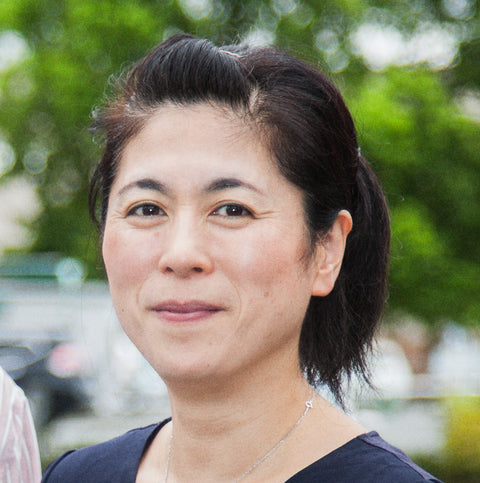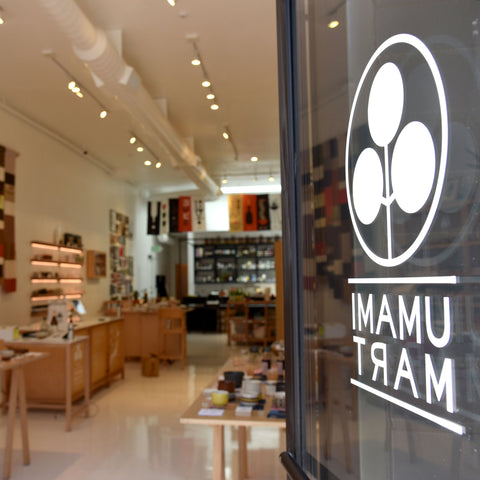
Welcome to the first edition of Female Frontrunners for Shochu Gumi! This is a theme that is dear to us at Umami Mart, as a women-led company: Yoko has been featuring women for the last six years of Sake Gumi, to coincide with Girl’s Day in Japan and International Women’s Day, both in March. We also take the opportunity to feature women makers in our shop – from tea and homewares to wellness products. It’s not just a myth: even in 2022, it’s hard to find women in any industry, and it brings us great joy to celebrate all the Female Frontrunners of Umami Mart.
Today we talk to Masako Furusawa, President of Furusawa Distillery, maker of this month's Shochu Gumi selection Motoko "A Mother's Legacy" Rice Shochu.
Please introduce yourself and your role at the distillery.
I joined the company in 1989 and became the 5th generation president in 2007. Furusawa Distillery was founded in 1892 and is currently celebrating its 130th anniversary. I am the 5th generation president. In 2018, the main distillery building and family home were registered as a National Tangible Cultural Property. Since our foundation, we have been producing shochu in the only dozo (traditional mud-wall) distillery in Miyazaki Prefecture.
How did you get into the shochu industry?
Born in 1966 as the eldest of three sisters, I grew up in the distillery, listening to the sounds and aromas. I watched my grandmother, mother, and father work in the distillery day and night.
What do you like most about shochu making?
The entire process is difficult, but it all leads to the end result of delicious shochu.
If I had to answer, I would say when I smell the aroma when delicious shochu is made. The sounds of the boiler, the smell of steamed rice, the warmth and aroma of koji, the sounds and smells of the moromi, the bubbling sounds of distillation and the smell as it drips off the still. I also like the sounds of the staff speaking to each other and the rhythmic sounds of each part of the production process. I get excited because all of these lead to delicious shochu.
 Moromi at Furusawa Distillery
Moromi at Furusawa Distillery
Although shochu-making has been male-dominated, do you think more women are entering the field? What has changed to allow more women to enter shochu making?
Furusawa Distillery is a distillery where women have been involved in the business since the end of WWII. At Furusawa Distillery, it is natural for women to be part of the company.
In general, benefits and working conditions have become easier (more automated). Also, there is no one who still believes that "women are inferior to men" or that "women are tainted."
What do you think is the most important step in shochu-making and why?
Honkaku shochu is made by single distillation using a pot still. Therefore, the the flavors and aromas of the ingredients and the production process is very important. I think it is critical to use good ingredients, of good quality, and complete each process with care.
Shochu is made by koji and yeast. The craftspeople help with that process. It's our job to create a good environment for that. My grandmother often told me, "Make us hear your footsteps." She meant that I should devote every spare moment to being in the distillery and make shochu with care.
 Koji room at Furusawa Distillery
Koji room at Furusawa Distillery
What kind of koji is used for Motoko?
Shiro koji (Kawauchi L-type)
How long have you been making this shochu?
Since 2019
What kind of vessel is this shochu aged? Stainless steel or ceramic? How long is it aged?
It was distilled in 2008 and aged indoors in traditional Japanese kame (earthenware pots) and enamel-lined tanks. The wooden storehouse is made of local Obisugi cedar with traditional mud walls.
What is makes this bottle extra special?
You can truly enjoy the flavor and sweet aged aroma of the rice.
What food pairings are best for this shochu?
Duck hot pot, gyoza.
How best to enjoy this shochu (cold, warm, room temperature)?
Oyuwari (temperature of the hot water between 40~60℃), or mizuwari with room-temperature water.
Is this shochu vacuum distilled or atmospheric?
Atmospheric pressure distillation
What different techniques are used to make this shochu?
It's rice shochu that has been carefully aged within the distillery.
Was there a specific inspiration for you to make this shochu?
An aroma-rich rice shochu made using only rice and aged for a long time. I have been waiting to release this shochu which has changed over time.
Where is the rice grown for Motoko?
Long-grain rice from Thailand.
Tell us a little bit about your town. How does your region influence your shochu-making?
It is located along the Nichinan coast of southern Miyazaki Prefecture. We are in the Odotsu district of the port city of Nichinan, which overlooks the Hyuga-nada Sea, the, "blue blue Pacific Ocean / the towering Nanatsubae Oshima (a group of rocky islands)..." as sung in the school song of the local Odotsu Elementary School. Of the 38 shochu distilleries in Miyazaki Prefecture, 12 of them are located in the Nichinan area, which has a prosperous brewing/distilling sector.
There are also six soy sauce breweries in the Nichinan area. With nearly a third of the prefecture's shochu distilleries located here, Nichinan City has a "kanpai with shochu" ordinance, to encourage residents to kanpai with their local honkaku shochu. In the Odotsu district, where Furusawa Distillery is located, there is an especially strong brewing/distilling sector, with a combined four shochu distilleries and soy sauce breweries.
The Odotsu district is a long, narrow stretch of land with a mild climate, sandwiched between the Pacific Ocean to the east and the Hosoda River to the west. With Aburatsu Port, Odotsu Port, and Meitsu Port nearby, the area has Japan's largest catch of pole-and-line skipjack tuna. Fresh fish, shellfish, crabs, and shrimp are an important part of our food culture. This is the environment in which Furusawa Distillery's honkaku shochu is nurtured.
What would you say is unique about your brewery?
The traditional, old-style flavor of handmade shochu. With the only dozo (traditional mud-wall) distillery in Miyazaki Prefecture used for our shikomi since our foundation, using traditional wooden trays in our koji room, and supported by our long history, we have continued to adamantly protect our tradition of handmade production that reflects the climate and environment around us.
The moromi is fermented in unglazed earthenware vats, and the carefully selected ingredients are distilled one pot at a time using hereditary know-how as well as new techniques to create the authentic, old-style flavor. Each bottle is carefully made with the passion and craftsmanship that has been passed down for 129 years. From when the summer heat finally ends in October until the first frost in November, we produce our shochu using quality sweet potatoes and rice in harmony with the natural environment and climate.
 Kame (ceramic vessels) for aging in the dozo
Kame (ceramic vessels) for aging in the dozo
Aren't walls made from clay delicate?
They're strong in some ways and fragile in others. The key point is maintenance. The walls will last for a long time if we repair them often. If we overlook the slightest damage, the wall may separate from the foundation, so we must check the walls every day.
What does "maintenance" entail?
The surface needs to be repaired on a regular basis. If we miss the cracks caused by typhoons, earthquakes, or other shocks, our distillery will crumble from the foundation up. Maintenance is important. If we do not neglect daily maintenance, it is going to be fine.
What is the advantage of maintaining the interior distillery walls? Is it related to the fungi living on them? Or do the walls help regulate temperature?
Earthen walls regulate humidity and temperature. The walls are also an important storehouse for our flavor – we say that it gives us our own flavor. [baka (場 (ba) = place; 香 (ka) = flavor/aroma). She's effectively referring to the unique microbiome within the distillery that is mostly enabled by those walls.]
When we repaint the walls, we don't do it all at once. We do it little by little over a period of several years to prevent our own flavor (場香/baka) from changing.
It is the new year! What are some plans you have for 2022? Anything new or exciting?
We are planning to make imo shochu using a new variety of sweet potato, which we are talking with our farmers about.
Photos courtesy of the distillery




Comments (0)
There are no comments for this article. Be the first one to leave a message!